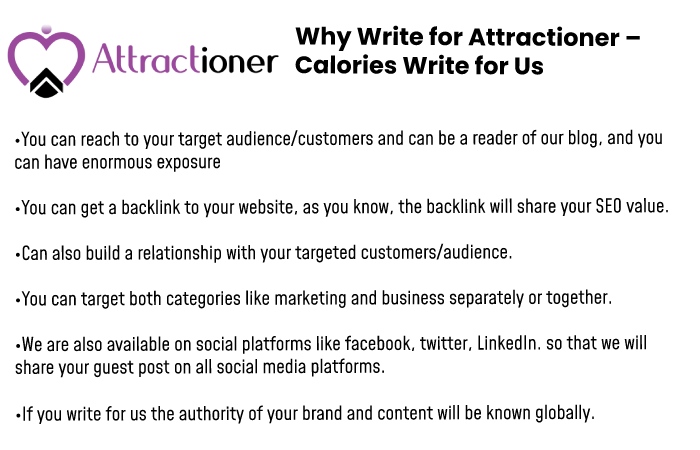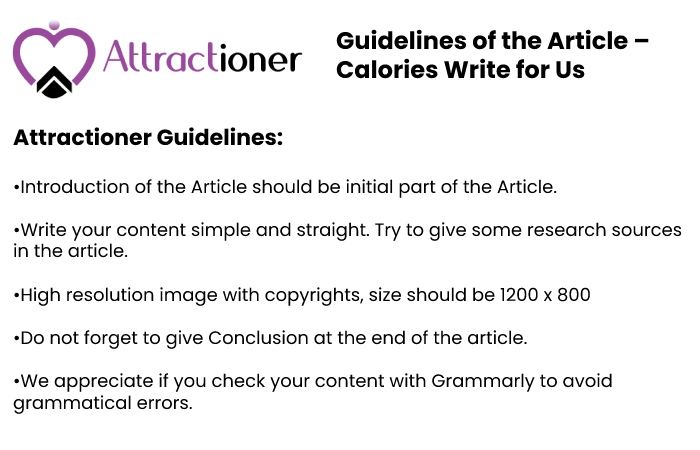Calories Write For Us
 A calorie is simply energy required to increase the temp. Of water by 1°c at standard atmosphere, which is approximately 4.185. Calories in nutrition relate to the energy humans obtain from the food and liquids consumed. As well as the energy they expend when engaging in physical activity.
A calorie is simply energy required to increase the temp. Of water by 1°c at standard atmosphere, which is approximately 4.185. Calories in nutrition relate to the energy humans obtain from the food and liquids consumed. As well as the energy they expend when engaging in physical activity.
On every grocery, the nutritional information includes a list of calories. Many diet plans for losing weight include cutting calories.
This MNT Knowledge Cent calories er article focuses on how the body uses energy and calories in food and beverages. MNT discusses the definition of a calorie, the daily caloric need for humans, and healthy ways to consume calories.
Health And Calories
To survive, the human body needs calories. People absorb this energy through food and drink. Without power, the body’s cells would perish, the heart and lungs would cease beating, and the organs would be unable to perform the fundamental functions required for survival.
People would probably live healthy lives if they merely ate the necessary quantity of calories each day. However, we can limit how much potential energy a meal has by counting its calories. It is because the material derived from the calories is just as significant as the calories themselves.
A healthy diet cannot be ensured by caloric restriction since various foods have varied physiological consequences.
Compared to eating lipids or protein, eating carbohydrates (carbs) will cause insulin levels to rise substantially more. Exceptionally, certain carbohydrates enter the circulation in the form of sugar or glucose significantly more quickly than others.
Legumes are a slower source of carbohydrates than refined flour. Fast carbohydrates are worse for general health and body weight management than slow-release carbs. A 500-calorie snack of popcorn with toffee or butter will not satisfy hunger as long as a 500-calorie lunch of fish or meat, salad, and some olive oil, followed by Fruit.
What Food is High in Calories?
Examples of calorie-rich foods include Proteins: Red meats, pork, chicken with skin on (roast or broil. Don’t deep fry for your health), salmon or other oily fish, beans, whole milk, eggs, cheese, full-fat yoghurt. Carbohydrates: potatoes, brown rice, whole grain pasta, whole grains, whole grain slices of bread.
What Fruit has the Most Calories?
The seven fruits have the highest calorie counts
- Avocados – Calories: 322 per whole avocado.
- Dates – Calories: 1 158 calories per 100 grams of pitted Medjool dates.
- Figs – Calories: 150 per five small figs.
- Shredded coconut – Calories: 466 per cup.
- Raisins – Calories: 429 per cup.
- Bananas – Calories: 121 per large banana.
- Prunes (also known as dried plum).
How to Update Your Articles?
To Write to Us, you can email us at contact@attractioner.com
Why Write for Us – Calories Write for Us
 Search Terms Related to Calories Write for Us
Search Terms Related to Calories Write for Us
Caloric theory
Nutrition
Food science
Energy value
Dietary caloric intake
Metabolic rates
Calorimetry
Empty calorie
Food energy
Nutrition facts label
Search Terms for Calories Write for Us
Submit an article
Guest posting guidelines
Become a guest blogger
Become an author
Submit post
Guest posts wanted
Suggest a post
Guest post
Write for us
Looking for guest posts
Guest posts wanted
Contributor Guidelines
Contributing writer
Writers Wanted
Guidelines of the Article – Calories Write for Us
 You can send your article to contact@attractioner.com
You can send your article to contact@attractioner.com
